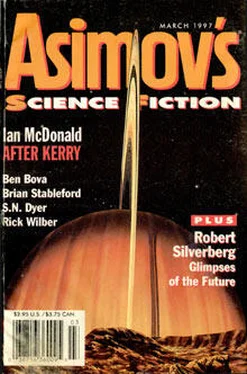William Sanders - The Undiscovered
Здесь есть возможность читать онлайн «William Sanders - The Undiscovered» весь текст электронной книги совершенно бесплатно (целиком полную версию без сокращений). В некоторых случаях можно слушать аудио, скачать через торрент в формате fb2 и присутствует краткое содержание. Год выпуска: 1997, Издательство: Dell Magazines, Жанр: Фантастика и фэнтези, на английском языке. Описание произведения, (предисловие) а так же отзывы посетителей доступны на портале библиотеки ЛибКат.
- Название:The Undiscovered
- Автор:
- Издательство:Dell Magazines
- Жанр:
- Год:1997
- ISBN:нет данных
- Рейтинг книги:3 / 5. Голосов: 1
-
Избранное:Добавить в избранное
- Отзывы:
-
Ваша оценка:
- 60
- 1
- 2
- 3
- 4
- 5
The Undiscovered: краткое содержание, описание и аннотация
Предлагаем к чтению аннотацию, описание, краткое содержание или предисловие (зависит от того, что написал сам автор книги «The Undiscovered»). Если вы не нашли необходимую информацию о книге — напишите в комментариях, мы постараемся отыскать её.
and
and for his short stories based on Cherokee tradition. (Two of these stories have appeared in the twelfth and thirteenth editions of the Year’s Best Science Fiction.) In his first tale for
Mr. Sanders works both veins at once…
The Undiscovered — читать онлайн бесплатно полную книгу (весь текст) целиком
Ниже представлен текст книги, разбитый по страницам. Система сохранения места последней прочитанной страницы, позволяет с удобством читать онлайн бесплатно книгу «The Undiscovered», без необходимости каждый раз заново искать на чём Вы остановились. Поставьте закладку, и сможете в любой момент перейти на страницу, на которой закончили чтение.
Интервал:
Закладка:
He also claimed that the town he came from was so big that it held more people than all of the People’s towns put together. That is of course a lie, but you can’t blame a man for bragging on his own tribe.
But nothing, I think, was as strange as the plei.
Forgive me for using a word you do not know. But as far as I know there is no word in your language for what I am talking about. Nor in ours, and this is because the thing it means has never existed among our peoples. I think the Creator must have given this idea only to the whites, perhaps to compensate them for their poor sense of direction and that skin that burns in the sun.
It all began one evening, at the beginning of his second winter with us, when I came in from a council meeting and found him sitting by the fire, scratching away on a big sheet of mulberry bark. Just to be polite I said, “Gado hadvhne? What are you doing?”
Without looking up he said in his own language, “Raiting a plei.”
Now I knew what the first part meant; rai-ting is what the whites call it when they make those talking marks. But I had never heard the last word before, and 1 asked what it meant.
Spearshaker laid his turkey feather aside and sat up and looked at me. “Ah, Mouse,” he said, “how can I make you understand? This will be hard even for you.”
I sat down on the other side of the fire. “Try,” I said.
O what a fond and Moone-struck fool am I! Hath the aire of Virginnia addl’d my braine? Or did an Enemy smite me on the heade, and I knewe it not? For here in this wilde country, where e’en the Artes of Letters are altogether unknowne, I haue begun the writing of a Play. And sure it is I shall neuer see it acted, neyther shall any other man: wherefore ’tis Lunacy indeede. Yet me thinkes if I do it not, I am the more certain to go mad: for I find my selfe growing more like vnto these Indians, and I feare I may forget what manner of man I was. Therefore the Play’s the thing, whereby lie saue my Minde by intentional folly: forsooth, there’s Method in my Madnesse.
Well, he was right. He talked far into the night, and the more he talked the less I understood. I asked more questions than a rattlesnake has scales, and the answers only left me more confused. It was a long time before I began to see it.
Didn’t you, as a child, pretend you were a warrior or a chief or maybe a medicine man, and make up stories and adventures for yourself? And your sisters had dolls that they gave names to, and talked to, and so on?
Or… let me try this another way. Don’t your people have dances, like our Bear Dance, in which a man imitates some sort of animal? And don’t your warriors sometimes dance around the fire acting out their own deeds, showing how they killed men or sneaked up on an enemy town—and maybe making it a little better than it really happened? Yes, it is the same with us.
Now this plei thing is a little like those dances, and a little like the pretending of children. A group of people dress up in fancy clothes and pretend to be other people, and pretend to do various things, and in this way they tell a story.
Yes, grown men. Yes, right up in front of everybody.
But understand, this isn’t a dance. Well, there is some singing and dancing, but mostly they just talk. And gesture, and make faces, and now and then pretend to kill each other. They do a lot of that last. I guess it is something like a war dance at that.
You’d be surprised what can be done in this way. A man like Spearshaker, who really knows how— ak-ta is what they are called—can make you see almost anything. He could imitate a man’s expression and voice and way of moving—or a woman’s—so well you’d swear he had turned into that person. He could make you think he was Bigkiller, standing right there in front of you, grunting and growling and waving his war club. He could do Blackfox’s funny walk, or Locust wiggling his eyebrows, or Tsigeyu crossing her arms and staring at somebody she didn’t like. He could even be Muskrat and his Tuscarora woman arguing, changing back and forth and doing both voices, till I laughed so hard my ribs hurt.
Now understand this. These akta people don’t just make up their words and actions as they go along, as children or dancers do. No, the whole story is already known to them, and each akta has words that must be said, and things that must be done, at exactly the right times. You may be sure this takes a good memory. They have as much to remember as the Master of the Green Corn Dance.
And so, to help them, one man puts the whole thing down in those little marks. Obviously this is a very important job, and Spearshaker said that it was only in recent times, two or three winters before leaving his native land, that he himself had been accounted worthy of this honor. Well, I had known he was a didahnvwisgi, but I hadn’t realized he was of such high rank.
I first purpos’d to compose some pretty conceited Comedy, like vnto my Loue’s Labour’s Lost: but alas, me seemes my Wit hath dry’d vp from Misfortune. Then I bethought my selfe of the Play of the Prince of Denmark, by Thomas Kyd: which I had been employ’d in reuising for our Company not long ere we departed London, and had oft said to Richard Burbage, that I trow I could write a Better. And so I haue commenced, and praye God I may compleat, my owne Tragedie of Prince Hamlet.
I asked what sort of stories his people told in this curious manner. That is something that always interests me—you can learn a lot about any tribe from their stories. Like the ones the Maskogis tell about Rabbit, or our own tale about the Thunder Boys, or—you know.
I don’t know what I was thinking. By then I should have known that white people do everything differently from everyone else in the world.
First he started to tell me about a dream somebody had on a summer night. That sounded good, but then it turned out to be about the Little People! Naturally I stopped him fast, and I told him that we do not talk about… them. I felt sorry for the poor man who dreamed about them, but there was no helping him now.
Then Spearshaker told me a couple of stories about famous chiefs of his own tribe. I couldn’t really follow this very well, partly because I knew so little about white laws and customs, but also because a lot of their chiefs seemed to have the same name. I never did understand whether there were two different chiefs named Ritsad, or just one with a very strange nature.
The oddest thing, though, was that none of these stories seemed to have any point. They didn’t tell you why the moon changes its face, or how the People were created, or where the mountains came from, or where the raccoon got his tail, or anything. They were just… stories. Like old women’s gossip.
Maybe I missed something.
To liue, or not to liue, there lyes the
To liue, or dye?S hall I
To dye or
To be of what? It
He certainly worked hard at his task. More often than not, I could hear him grinding his teeth and muttering to himself as he sat hunched over his marks. And now and then he would jump up and throw the sheet to the ground and run outside in the snow and the night wind, and I would hear him shouting in his own language. At least I took it to be his language, though the words were not among those I knew. Part of his medicine, no doubt, so I said nothing.
God’s Teethe! Haue I beene so long in this Wildernesse, that I haue forgot all Skill? I that could bombast out a lyne of blank Uerse as readily as a Fishe doth swimm, now fumble for Wordes like a Drunkard who cannot finde his owne Cod-peece with both Handes.
Читать дальшеИнтервал:
Закладка:
Похожие книги на «The Undiscovered»
Представляем Вашему вниманию похожие книги на «The Undiscovered» списком для выбора. Мы отобрали схожую по названию и смыслу литературу в надежде предоставить читателям больше вариантов отыскать новые, интересные, ещё непрочитанные произведения.
Обсуждение, отзывы о книге «The Undiscovered» и просто собственные мнения читателей. Оставьте ваши комментарии, напишите, что Вы думаете о произведении, его смысле или главных героях. Укажите что конкретно понравилось, а что нет, и почему Вы так считаете.












